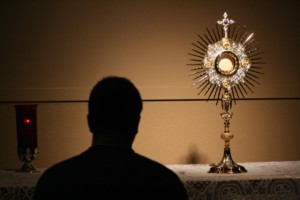Welcome to TOB Tuesdays Refreshed. Over the next few months we will revisit Katrina’s past blogs followed by Jack Henz’* reflection.
Divinization: Sharing vs. Participating by Katrina J. Zeno, MTS
Did you enjoy steeping in spiritualization this past week? I truly hope you experienced a deeper unity between your body and spirit and an even greater connection to your own embodiment as a prelude to this week’s promised topic: divinization!
Divinization is an uncommon and often misunderstood concept among Catholics in the Latin Rite. However, for our brothers and sisters in the Eastern Byzantine Rite, divinization is their bread and butter. My favorite Eastern theologian, Archbishop Joseph Raya, has a quote-worthy phrase to describe salvation: Salvation, he says, is a “symphony of divinization.” Simply put, God creates and redeems us in order to divinize us. (See Theophany and Sacraments of Initiation, pp. 68-69.)
Sometimes it’s helpful to look at what something is not before delving into what something is. Divinization is not that we are a god or become God by nature. We do not share the same Divine Nature as God nor does our human nature somehow change to become divine. Unwittingly, we can absorb these inaccurate impressions when we read some of the celebrated statements written by the early Church Fathers. Here are a few gems:
- “For the Son of God became man so that we might become God.” (St. Athanasius)
- “…yet thereby it is demonstrated that all men are deemed worthy of becoming ‘gods,’ and of having power to become sons of the highest.” (St. Justin Martyr)
- “…he who listens to the Lord, and follows the prophecy given by Him, will be formed perfectly in the likeness of the teacher – made a god going about in flesh.” (St. Clement of Alexandria)
- “From the Holy Spirit is the likeness of God, and the highest thing to be desired, to become God.” (St. Basil the Great)
- “If we have been made sons of God, we have also been made gods.” (St. Augustine)
St. Thomas Aquinas echoed these same thoughts when he wrote, “The only-begotten Son of God, wanting to make us sharers in his divinity, assumed our nature, so that he, made man, might make men gods” (quoted in The Catechism of the Catholic Church, no. 460).
Even a contemporary Catholic writer introduces into one of his books phrases such as “…the ancient and surprisingly orthodox Christian assertion that God intends to make you a god”; “…fulfilling your destiny to become the god you were meant, by God, to be”; and “…because of our fallen humanity, we are, for now, broken gods in need of deeper healing.”
Finally, if we add to these statements the New Age belief that we are all manifestations of Divinity along with Buddhist and Sufi mysticism that claim our awakened consciousness is destined to merge with Universal Consciousness and thus achieve a Divine Oneness, then we can easily be misled and march down the path to our own divinity.
So right up front, let’s be repetitively clear: you are not God nor a god (sorry to break the news to you…). Divinization is not restoring you to your lost godhood, nor awakening your hidden divinity within your soul or consciousness, nor endowing you with a new, divine nature. The ultimate end of many of these beliefs is the disappearance of human personhood into Divinity through a spiritual fusion. But this is not the ultimate goal of Christianity. Rather, St. JPII clearly states that your eternal, embodied union with God will not absorb your personhood but will make you even more distinctively you in your masculinity or femininity! (cf. TOB A67:3)
St. JPII clearly states that your eternal, embodied union with God will not absorb your personhood but will make you even more distinctively you in your masculinity or femininity!
What, then, is divinization?
Scripturally, the concept of divinization is described in 2 Peter 1:3-4: “His divine power has granted to us all thing that pertain to life and godliness, through the knowledge of him who called us to…become partakers in the divine nature.” Divinization likewise surfaces in the liturgy, although the exact term is never used. Instead, during the preparation of the gifts, the priest (or deacon) prays, “By the mystery of this water and wine, may we come to share in the divinity of Christ who humbled himself to share in our humanity.” Additionally, the “Prayer after Communion” prayed aloud by the priest often contains the phrase: “…so you may make us sharers of his divine nature…”
“Partakers of the divine nature…” “share in the divinity of Christ…” “make us sharers of his divine nature…” – these are the different ways in English the Church tries to communicate the reality of divinization. Unfortunately, the verb “share” doesn’t quite capture the inner essence of divinization. To share something often implies portioning out something and giving part of it away while, at the same time, keeping some of it for ourselves. We can “share” any number of things – a bottle of wine, a good joke, a soccer game with a friend. These are wonderful experiences, and they can even create a connection between us and the person who shares it, but the “sharing” is usually somewhat external, something given away or outside us.
God, however, doesn’t simply want to “share” His life with us in an external manner. God wants us to participate in Divine Life, to draw us into the inner reality of His Trinitarian Life and Love so as to experience His Divine Life coursing through us from the inside out.
Praying the mass in Spanish helped sensitize me to this distinction between “share” and “participate.” What is described as “share” in the English celebration of the Mass is almost always translated as “participar” in Spanish – we pray to “participate in the divinity of Christ” and that “we may be made worthy to participate in the divine nature.” Similar to my encounter with the word “primicias” (see Blog #9), the Spanish usage of “participar” instead of “compartir” (to share) spurred me to think more deeply about the difference between the two.
 The difference between “share” and “participate” may seem like a minor detail until one considers the difference between a friend inviting you to share in watching a soccer match with him versus participating in an actual soccer game. The difference is cataclysmic! One involves experiencing the reality from the outside (watching the soccer game); the other involves experiencing the reality from the inside and being an actual part of it (i.e., part-icipation).
The difference between “share” and “participate” may seem like a minor detail until one considers the difference between a friend inviting you to share in watching a soccer match with him versus participating in an actual soccer game. The difference is cataclysmic! One involves experiencing the reality from the outside (watching the soccer game); the other involves experiencing the reality from the inside and being an actual part of it (i.e., part-icipation).
Forgive me if I seem to be exaggerating the importance of this distinction, but we are speaking about the ultimate end, goal, meaning, and purpose of our lives. God’s eternal plan has always been for our human nature to participate in Trinitarian Life and Love. He designed our bodies to experience union and communion (not just external sharing) with the glorified Body of Christ similar to how we might experience adrenaline coursing through our bodies by actually participating in the soccer game.
This is why the “p” quote from TOB A67:3 (see Blog #12) is not only critical but fundamental to our understanding of divinization. St. JPII uses words such as participate, penetrate, permeate, and peak to describe our ultimate union and communion with God in our glorified bodies. In other words, God communicates His divine life to our human nature not from a distance by portioning off packets of grace and “sharing” them with us, but by dwelling, abiding, living within us.
God communicates His divine life to our human nature not from a distance by portioning off packets of grace and “sharing” them with us, but by dwelling, abiding, living within us.
In TOB A51:3, St. John Paul II describes justification by faith, which initiates divinization, in this manner: “…the power of Christ himself working in man’s innermost [being] through the Holy Spirit.” From this starting point, St. JPII develops our Christian vocation as life in the Spirit characterized by a continuous, divinizing dynamic: “What is decisive for the dignity of the human body, in [St.] Paul’s eyes, is not only the human spirit…but much more so the supernatural reality of the indwelling and continuous presence of the Holy Spirit in man – in his soul and his body – as the fruit of the redemption accomplished by Christ.”
Through baptism the Holy Spirit comes to dwell within the “temple” of our bodies and we are incorporated – united! – to the Glorified Body of Christ (see Catechism of the Catholic Church, no. 1213). Regrettably, we often think of the Holy Spirit as a bird who descends upon us and showers us with grace. In fact, once when I was speaking at a young-adult conference on Pentecost, I quipped, “The Holy Spirit is not a bird but a bond!”
Ironically, my own words stopped me in my tracks as I quickly reconsidered what I had just said: The Holy Spirit is not a bird, but the bond of love between the Father and the Son. Fr. John Arintero, OP, unfolds this same truth, but much more poetically when he writes, “So this sovereign Spirit is the eternal expression of the mutual love of the Father and the Son, the perfect fruition of Their love. He is the close embrace which unites them eternally, the ineffable kiss of love which They eternally give to each other” (The Mystical Evolution, Vol 1, p. 174).
If the Holy Spirit is continuously dwelling in you, then you are continuously participating in the mutual love of the Father and Son: there you are, squeezed in between the Father and Son in the embrace that unites Them eternally through the Holy Spirit. Or, to return to my favorite Trinitarian image, in the Divine Dance of the Inner Life of the Trinity, you are inserted into the Eternal Embrace between Father and Son, bonded to them by the Divine Music of the Holy Spirit, as they dance around (perichoresis) in Love, Life, and Creativity with you right in their dynamic midst!
The Gospel of John is filled with this imagery of God abiding, dwelling, living in the Christian. John 17:22-23 narrates Jesus praying to His Father on behalf of his disciples, saying, “…that they may be one even as we are one, I in them and you in me, that they may become perfectly one…” In John 14:17, Jesus speaks of sending the Spirit of truth, “for he dwells with you, and will be in you.” “In that day,” Jesus continues, “you will know that I am in my Father and you in me and I in you…” (Jn 14:20).
And then there’s John 15 where Jesus refers to himself as the Vine and to us as the branches. It is the most heavily-laden Gospel passage about abiding in Christ – and therefore about divinization. Jesus uses the image of vine and branch to indicate how we receive Divine Life from Him through an organic union. A branch participates in the life of the vine and the vine communicates its life to the branch. This organic union is not only life-giving but fruitful. John 15:5 says it clearly: “I am the vine, you are the branches. He who abides in me, and I in him, he it is that bears much fruit, for apart from me you can do nothing” [a-part = the opposite of part-icipation].
Can you imagine perfect intimacy with God, perfect union and communion with the Trinity, that is not just a sharing of spiritual life, but your whole embodied person participating in divinity? Can you imagine already experiencing this process of divinization on earth by being in Christ and Christ being in you through the Eucharist so that the two (you and Christ) become one flesh and divinity permeates your humanity? And can you imagine divinization reaching its perfection in eternity when your glorified body is united to the Glorified Body of Christ in an eternal union and holy communion so that your body is not only saturated by your spirit (spiritualization) but is also fully saturated by divinity (divinization) and joy bursts forth from your body for the privilege of participating as fully as humanly possible in the Inner Life of God?
Okay, okay, pull me down from the clouds, but this is what gets my motor going every day. This is what Jesus promised when he told the synagogue crowd, “…he who eats my flesh and drinks my blood has eternal life, and I will raise him up on the last day” (John 6:54). Eternal life is not a bland existence strung out forever and ever and ever and ever. It is eternal, divinized Relationship! It is being full of grace by being in the Divine Embrace! It is experiencing a union and holy communion with the Glorified Body of Christ and Trinitarian Love that causes you to finally arrive at the best and most glorious version of yourself!
This week, I invite you to ponder the life-changing difference between sharing vs. participating in the Inner Life of God and to be especially aware of being in Christ and Christ being in you during your Eucharistic holy communion. And remember…you are a gift (on the way to full divinization)!
© Katrina J. Zeno, MTS
(Please “share” this blog – and invite your friends to like the JPII Resource Center FB page. Thank you.)
Jack Henz’ Reflection: Participating in the Source and Summit
Reading Katrina’s Blog 14 on the difference between sharing and participating struck a deep chord in me. It caused my mind to drift back to the many times in my 30’s and 40’s that I attended Mass more as an obligation than a destination. I was putting in time in a kind of external manner, merely “sharing” Mass without a deep connection.
As I approached 50, I began to recognize the Mass and the Eucharistic celebration as the high point of my week. I started to shift to full, active “participation,” although I was still not at 100 percent, but was certainly nearing 75 percent. The trouble was I only made time to go to Mass on Sunday.
During a Lent in my mid-50’s, I made the conscious effort to attend noon Mass once or twice during the week – I had changed jobs and the cathedral was only six blocks from my office. Along with more frequent Mass attendance, I found myself going to confession monthly. My relationship with Jesus spread from the Eucharist to daily prayers during my commute time. I started to say the rosary several times a week.
As my participation in the Mass grew, I experienced the strengthening of my relationship with Jesus following reception of the Eucharist. My prayer life progressed to a daily practice, and I could feel Our Lord drawing me into a closer relationship with the Trinity.
As my participation in the Mass grew, I experienced the strengthening of my relationship with Jesus following reception of the Eucharist. My prayer life progressed to a daily practice, and I could feel Our Lord drawing me into a closer relationship with the Trinity. As I hit 60, I joined a That Man is You men’s fellowship at my parish. TMIY helped me cope with my personal faith concerns and deepened my personal relationship with Jesus into a resolve to become a more active Catholic man.
My deeper Catholic commitment was fulfilled shortly after I moved to Phoenix in my mid-60’s as I began participating in classes at the Kino Catechetical Institute. After an encouraging first year, I found a passion for St. John Paul II’s Theology of the Body, which provided me with the previously missing links of our union and communion with Jesus and an embodied, spiritualized and divinized eternity of participating love with the Trinity. What a gift!
 Soon, I committed myself to a weekly hour of adoration. Lectoring and serving at daily Mass, as needed, intensified my relationship with Jesus even more. I came to cherish the words of Pope Benedict XVI because they ring so true for me: “The Eucharist is the source and summit of the bond of friendship with Jesus. You are very close to Jesus in the Eucharist, and this is the most important sign of his friendship for each one of us. Do not forget it” (Address to Altar Servers, August 2, 2006).
Soon, I committed myself to a weekly hour of adoration. Lectoring and serving at daily Mass, as needed, intensified my relationship with Jesus even more. I came to cherish the words of Pope Benedict XVI because they ring so true for me: “The Eucharist is the source and summit of the bond of friendship with Jesus. You are very close to Jesus in the Eucharist, and this is the most important sign of his friendship for each one of us. Do not forget it” (Address to Altar Servers, August 2, 2006).
God willing, and if my mind stays lucid into my 90’s or beyond, I will never forget that the Eucharist is the closest we come to Jesus and divinization while here on this earth. I am so grateful that over the decades what began as a rather compulsory “sharing” in the Mass has exploded into “full-on participation” in the Mass, daily prayer time, Eucharistic adoration, and deep – dare I even say intimate – communion with Christ. My journey from sharing to participating in a deepening relationship with Jesus is truly the source and summit of my life.
©by Jack Henz
We invite you to share your own 2-3 line reflection on our JPII Resource Center Facebook page by clicking here.
*Jack Henz is a retired meteorologist and a graduate of the Diocese of Phoenix ‘s Kino Catechetical Institute. Together with his wife Karen, he is a passionate catechist concerning all things Catholic, especially the Theology of the Body.





